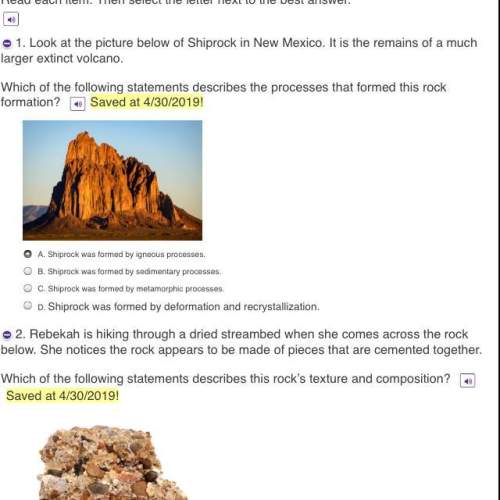NEED HELP ASAP
QUESTION 5
Did the universe cool off or get hotter as it expanded after...

Biology, 05.06.2020 06:57, QueenMiah16
NEED HELP ASAP
QUESTION 5
Did the universe cool off or get hotter as it expanded after the 'big bang"?
The universe is the same temperature it has always been
The universe gets hotter as it expands, and cooler when it contracts.
The universe got hotter and is still getting hotter.
The universe cooled off after the 'big bang"
QUESTION 6
Cosmology is the study of the universe.
True
False
QUESTION 7
What is happening to the universe today?
The universe is the same as it was billions of years ago.
The universe is expanding.
The universe is contracting.
QUESTION 8
Remote sensing of the Earth's surface and atmosphere may involve the use of what type of instruments?
satellites
underwater probes
calorimeter
siesmographs
QUESTION 9
Droughts can influence which of the following?
both the resources and population
the resources available to a population
the population directly
neither the resources nor the population
QUESTION 10
Remote sensing allows us to do which of the following?
determine what the weather is like in remote locations such as in the middle of the ocean
locate and examine some natural disasters
study drought conditions in different parts of the world without the need to travel to remote locations
All of the above.
QUESTION 11
What is the most abundant salt in seawater?
quartz sulfate
sodium chloride
soap
sugar
QUESTION 12
Why is the ocean dark below ~200 meters?
All the light has been absorbed by the water above.
The water is too salty for the light to travel farther.
wet water absorbs more light than dry water
The light reaches to all depths of the ocean.
QUESTION 13
What effect does the Earth’s moon have on the oceans?
The Moon is responsible for the tides.
When the Moon is full, cheese from the Moon may fall into the ocean.
The Moon causes extreme temperature fluctuations every 30-32 years
The Moon is too far away from the Earth to have an impact.

Answers: 1
Other questions on the subject: Biology

Biology, 21.06.2019 18:00, gora2005
1. the passing of is the basis of heredity. 2. our encode the instructions that define our traits. 3. each of us has thousands of genes, which are made of and reside in our chromosomes. 4. in addition to our genes, the we live in also define our traits. 5. humans have two complete sets of chromosomes. 6. when parents conceive a child, each parent contributes set of chromosomes. 7. every child receives of its chromosomes from the mother and half from the father. 8. this transfer takes place at when the father’s sperm joins the mother’s egg. 9. while most cells in our bodies have two sets of chromosomes, or a total of egg and sperm each have chromosomes. 10. when egg and sperm unite they create a single cell called a 11. each parent contributes complete set of chromosomes to their child. 12. since the parents contribute the chromosomes to each new child, every child inherits a unique set of chromosomes. 13. as a result, every baby will have a combination of traits.
Answers: 1

Biology, 21.06.2019 19:30, Thania3902
What makes the results of a scientific experiment accurate? a) having multiple trials b) lacking any supporting data c) working in a lab d) using a hypothesis that is always true
Answers: 2

Biology, 22.06.2019 01:20, claytonashley30
In a cladogram' when does a group of organisms branch off
Answers: 1

Biology, 22.06.2019 04:40, adrianna2324
Awoman whose sister tested positive for a specific mutation in the brca1 gene, which increases the risk for breast and ovarian cancer, is found not to have that mutation but does have a mutation of unknown significance near the known mutation site. how should this woman be counseled? select one: a. she should be informed that her risk for breast cancer is greater than the general population but not as great as her sister’s risk. b. she should be informed that because she does not have the mutation, her risk for breast cancer is not greater than that of the general population. c. she should be informed of her gene mutation status and be presented with all the available prophylaxis options and reconstruction options. d. she should be informed that she does not have the specific mutation but that because another mutation is present she should be vigilant about screening
Answers: 1
Do you know the correct answer?
Questions in other subjects:
















